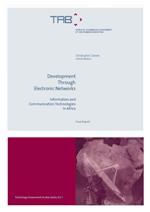The Committee’s Preface
 Following an initiative of the Committee on Economic Co-operation and Development, the Office of Technology Assessment (TAB) at the German Bundestag (i.e. the German parliament) has carried out a project on the relevance of the Internet and other new information and communication technologies (ICTs) for social advancement in developing countries. This final report, entitled »Internet communication in and with developing countries – the example of Africa and opportunities for development co-operation«, documents the results of the project.
Following an initiative of the Committee on Economic Co-operation and Development, the Office of Technology Assessment (TAB) at the German Bundestag (i.e. the German parliament) has carried out a project on the relevance of the Internet and other new information and communication technologies (ICTs) for social advancement in developing countries. This final report, entitled »Internet communication in and with developing countries – the example of Africa and opportunities for development co-operation«, documents the results of the project.
The past decade has seen the topic of ICT move significantly up the development policy agenda. Although there has been highly controversial discussion on the best ways of approaching the promotion of ICT and on the outcomes of promotion activities, everyone agrees that the problems faced by developing countries will only be exacerbated if they continue to lag behind in respect of ICT in the long term. What is more, both new and old ICTs – including the Internet and mobile telephony – are in many cases already being put to good use in development co-operation activities, although considerable potential still remains untapped.
Against this backdrop, the Committee on Education, Research and Technology Assessment commissioned the TAB to investigate opportunities presented by ICT and in particular the Internet, problems of the global digital divide, and basic prerequisites for ICT use to promote development. Because
sub-Saharan Africa faces highly specific development challenges and because many of its problems, in the area of ICT as elsewhere, are particularly dramatic in nature, this region was chosen as the project’s geographical focus. During the course of the project, quantitative and qualitative empirical studies into the use of the Internet and other ICTs were conducted; these also included research at the local level. Actors from African and other developing countries were involved in work on the project.
In the first place, the report analyses and discusses the use of ICT and how it can contribute to social development in the context of the situation in developing countries.
Secondly, a more detailed examination is undertaken of contributions relating in particular to the areas of democracy, good governance and civil society, of industry and trade, and of education, research and technological development.
Thirdly, the results of these analyses are used to draw conclusions about concrete and strategic courses of action and challenges for German development cooperation within the context of general issues relevant to research and education policy.
As one might expect, it was found that ICTs can, under certain circumstances, make a considerable contribution to social advancement in developing countries. Precisely the example of sub-Saharan Africa, however, shows that there are still very significant obstacles to the use of these technologies, and especially the Internet, to promote development throughout society. Be that as it may, societies in developing countries are in great need of both new and old ICTs, and a variety
of sensible uses can already be observed. Besides strengthening developmentoriented elites in civil society, government and business, such use also directly improves the life situation and opportunities of the poor. One can hardly overemphasise the importance of the shift in cultural and political mentality that goes hand in hand with the dissemination of modern ICTs. As far as development co-operation is concerned, there are many different ways to promote the use of ICT, a challenge that cuts across many areas of development policy.
This report provides the German Bundestag with a broad and solid information basis for further engagement with the question of ICT for development. For sub-Saharan Africa, a region of great importance in development policy, the report considerably extends the contextual knowledge available to political decisionmakers and development co-operation actors. Furthermore, the study will make a valuable contribution to any future attempt to come to terms with the opportunities
and challenges one may expect to meet on the often difficult common path towards a global knowledge society.
Berlin, April 15, 2008
The Committee on Education, Research and Technology Assessment
|
Burchardt, Ulla
|
|
Member of the German Bundestag
|
Committee Chairwoman
|
| |
|
Fischer, Axel E.
|
|
Member of the German Bundestag
|
Rapporteur
|
| |
|
Barth, Uwe
|
|
Member of the German Bundestag
|
Rapporteur
|
| |
|
Fell, Hans-Josef
|
|
Member of the German Bundestag
|
Rapporteur
|
| |
|
Schulz, Swen
|
|
Member of the German Bundestag
|
Rapporteur
|
| |
|
Sitte, Petra
|
|
Member of the German Bundestag
|
Rapporteur
|
|

